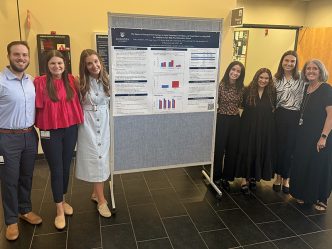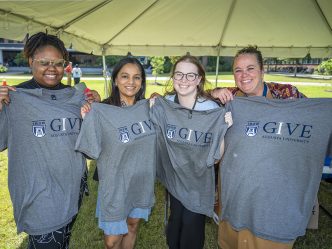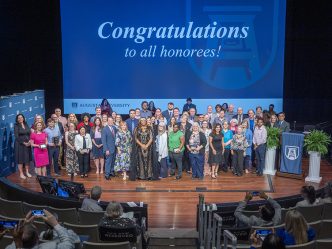Georgia Regents University continues its long tradition of offering innovative, forward-thinking degrees with the launch of its new doctoral degree in applied health sciences.
The three-year, practice-oriented doctoral program is the first of its kind in the University System of Georgia, something the Board of Regents noted when they approved the program in March.
“This is a program that fills a major gap,” said Dr. Andrew Balas, Dean of the College of Allied Health Sciences. “It’s a PhD program that is targeted toward innovation that changes health care and the public’s health.”
Designed to equip health professionals with the skills to solve health care issues in numerous fields of allied health, graduates will be uniquely prepared for roles in the health care work force, which is made up of some 80 different professions. In fact, approximately 60 percent of all health care workers are allied health professionals.
According to Balas, the demand for health care workers is twice the growth of the national economy. By 2020, the U.S. will require 20 million health care professionals. The College of Allied Health Sciences has been developing programs to support this growth since the 1930s.
Departments within the College of Allied Health Sciences include Clinical and Environmental Health Sciences, Dental Hygiene, Health Management and Informatics, Medical Illustration, Medical Laboratory, Imaging and Radiologic Sciences, Occupational and Physical Therapy, and Physician Assistant. Graduates of these departments enjoy a nearly 100 percent employment rate.
While active development of the doctoral degree in applied health sciences started about two-and-a- half years ago, Balas said the program had been a dream of the college, its faculty, and his predecessors for a long time.
Though many students will come from the local population, Balas said he expects to draw from across the state and nation, eventually even including international enrollment. With a mix of distance technology and on-campus work, Balas believes the program’s flexibility will appeal to students from all locations, and he hopes its practical focus will attract results-driven practitioners.
“This is called applied health sciences, and that’s not an accidental term,” he said. “We have a number of PhD programs at GRU that look at basic science skills and look at the development of some of the scientific understanding of the mysteries of human health,” Balas said. “This particular program that we developed is really looking into science and research development from a very applied perspective, so we really expect that the results of our projects will be largely applicable to health care practitioners.”
All of which dovetails with the type of students Balas expects to join the program, which debuts in the fall.
“It’s actually targeted toward the working professional,” he said. “To a large extent, we would like to have practicing clinicians becoming very competent researchers, building their expertise to develop new knowledge for better health care practices.”
For more information, visit the College of Allied Health Sciences here.
 Augusta University
Augusta University



